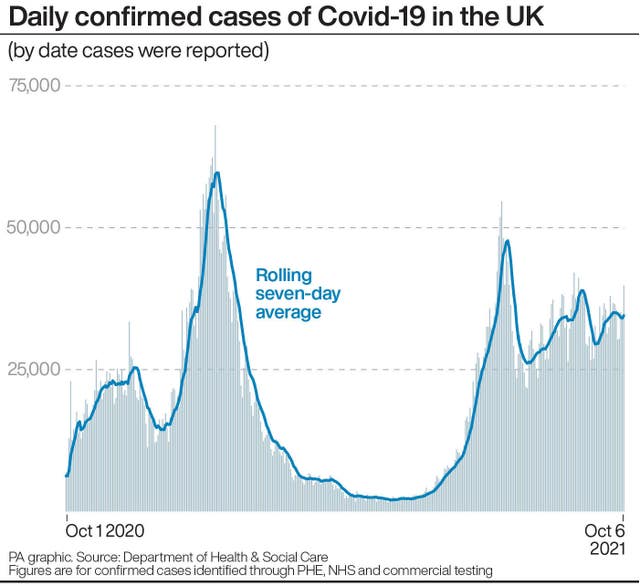More than a million people in the UK are estimated to be experiencing self-reported long Covid, new figures show.
Data from the Office for National Statistics (ONS) suggests 1.1 million people in private households experienced long Covid during the four weeks to September 5.
Increase in figures
This is up from 970,000 in the previous survey and is the largest monthly increase since estimates of self-reported long Covid prevalence were first published in April, the ONS said.
Self-reported long Covid is defined as symptoms persisting for more than four weeks after their first suspected coronavirus infection that are not explained by something else.
An estimated 1.1 million people (1.7% of the population) experienced self-reported long COVID in the 4 weeks to 5 September 2021.
This is up from 970,000 the previous month as infections rose over the summer – the largest monthly increase since April 2021 https://t.co/64ncvbHne5 pic.twitter.com/8Al2NWlolG
— Office for National Statistics (ONS) (@ONS) October 7, 2021
The data also shows an estimated 405,000 people have experienced self-reported long Covid that has lasted for at least a year, up from 384,000 a month earlier.
The ONS said the figures, published on Thursday, reveal a rise in the number of people who were first infected less than eight weeks previously.
It added:
There has been a notable increase in the number of people with self-reported long Covid who were first infected (or suspected they were infected) less than eight weeks previously, from 50,000 (5.2% of those with self-reported long Covid) at August 1 2021 to 132,000 (12.2%) at September 5 2021.
These new cases of self-reported long Covid follow a period of increased incidence of Covid-19 infections in the UK during July 2021.

The effects
Long Covid was also estimated to be adversely affecting the day-to-day activities of 706,000 people – around two-thirds of those with self-reported long Covid – with 211,000 reporting that their ability to undertake day-to-day activities had been “limited a lot”, the ONS said.
Fatigue was the most common symptom (experienced by 56% of those with self-reported long Covid), followed by shortness of breath (40%), loss of smell (32%), and difficulty concentrating (31%).
Who it’s affecting
The ONS said prevalence of self-reported long Covid was highest among adults aged 35 to 69, and was higher in all age groups except those 70 and over compared to the previous month.
The largest monthly increase in prevalence was among young adults aged 17 to 24, from 1.2% of the population at August 1 to 1.9% at September 5.
People aged 17 to 24 years experienced the biggest monthly increase in the prevalence of self-reported long COVID of all age groups https://t.co/62jBj10NRV pic.twitter.com/reAJ9Vc5ox
— Office for National Statistics (ONS) (@ONS) October 7, 2021
While long Covid prevalence was highest among people working in health and social care, the ONS said the largest increase in prevalence was among those working in hospitality, up from 1.6% to 2.6%.
It added:
As a proportion of the UK population, prevalence of self-reported long Covid was greatest in people aged 35 to 69 years, females, people living in more deprived areas, those working in health or social care, and those with another activity-limiting health condition or disability.
Compared with the previous month, prevalence of self-reported long Covid was notably higher among young adults aged 17 to 24 years and people working in the hospitality sector.
Featured image via – Flickr – Navy Medicine









